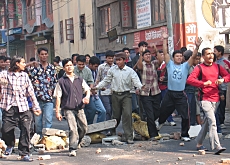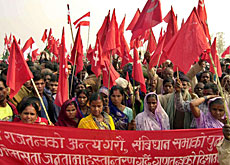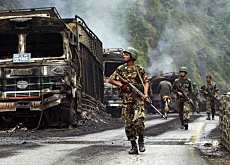Swiss aid agency condemns Nepal crackdown

The Swiss Agency for Development and Cooperation (SDC) has described as "arbitrary" arrests during anti-government protests in the Nepalese capital, Kathmandu.
Protests started only a few days after Switzerland had invited representatives of the government and civil society for talks in Geneva to discuss the country’s human rights situation.
The meeting, scheduled for April 18, is intended to serve as a platform for the head of the Office of the UN High Commissioner for Human Rights (OHCHR) in Kathmandu, Ian Martin, non-governmental and human rights organisations to express their views on the situation in the Himalayan kingdom.
“There is an extensive repression apparatus on the state side, which now denies democratic rights and intimidates and limits the freedom of movement,” Jörg Frieden, the SDC’s country director in Nepal, told swissinfo.
“There have been too many casualties among civilians and too many disappearances. I don’t even want to mention what has been happening in the last few days – arbitrary arrests of peaceful demonstrators and indiscriminate use of force and lack of discipline by security forces,” Frieden said.
He was referring to the detention of more than 150 lawyers, doctors and journalists during a four-day strike called by the seven-party opposition alliance. The strike is a campaign against King Gyanendra, who has come in for widespread international criticism over his crackdown on opposition groups.
As a countermove, the authorities imposed all-day curfews in Kathmandu and the surrounding valley to prevent massive anti-royalist rallies against the king’s absolute rule.
Clashes
Three people have died and hundreds have been injured in clashes with the police as thousands of activists defied curfew orders at several points around the capital. Police have been ordered to shoot anyone violating the curfew, which entered its third consecutive day on Monday.
Despite daily clashes between armed forces and demonstrators defying the government’s ban on political rallies, Frieden said the Nepali people had coped very well with the conflict, which has lasted more than ten years and has left more than 13,000 dead.
“It seems impossible that people so kind and friendly are not able to find a compromise to their political problems. A possible solution would be to integrate the Maoist rebels into the political life, leave some role to the king and establish a democratic regime based on elected representatives,” Frieden concluded.
Rebel violence has escalated since King Gyanendra sacked the government and seized absolute power in February last year.
swissinfo, Billi Bierling in Kathmandu
Nepal is one of the Swiss Agency for Development and Cooperation’s (SDC) priority countries. The SDC in Nepal works mainly in rural areas, which are at least partially controlled by the Maoist insurgency.
The agency, which oversees an annual development budget of SFr20 million ($15.3 million) in Nepal, is active in rural infrastructure development, building suspension bridges and roads.
The SDC is also involved in activities linked to the conflict such as human rights initiatives, both nationally and at local level.
Population of Nepal: 26.3 million.
Head of State: King Gyanendra Bir Bikram Shah Dev.
Maoist rebels have been waging a campaign against the constitutional monarchy since 1996 in a conflict that has left more than 13,000 people dead.
Gyanendra declared a state of emergency in February 2005.

In compliance with the JTI standards
More: SWI swissinfo.ch certified by the Journalism Trust Initiative


You can find an overview of ongoing debates with our journalists here . Please join us!
If you want to start a conversation about a topic raised in this article or want to report factual errors, email us at english@swissinfo.ch.